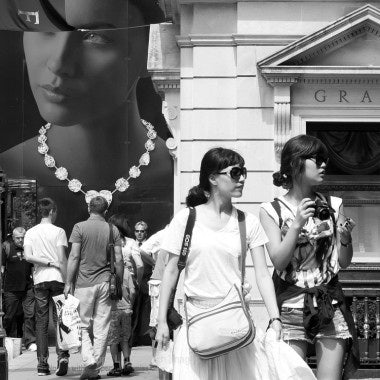Chinese Shoppers Spent US$324.5 million On London High Street Last Year#

Chinese tourist-shoppers spent some $324 on the London high street in 2010, a figure that's expected to grow dramatically this year (Image: Light Touch)
The rise of the mainland Chinese tourist-shopper, predicted several years ago by Chadha and Husband in their book The Cult of the Luxury Brand: Inside Asia's Love Affair With Luxury, continues to make itself felt in key global markets like London. Last year, Jing Daily spoke to Linda Pilkington, founder of the London perfumery Ormonde Jayne, who told us that mainland Chinese tourists have seemingly come out of nowhere and, seemingly overnight, have reshaped the London high-end market, supplanting the once-ubiquitous Russians and rivaling cashed-up Middle Eastern shoppers on Bond Street, Jermyn Street and Savile Row. Unlike the Hong Kong Chinese tourists who preceded them, Pilkington said, mainland Chinese tourists typically travel in groups, shop with purpose, and -- owing to the fact that few of the older travelers speak English -- are less swayed by salespeople and marketing-speak.
As mainland Chinese tourists have established themselves as a key demographic for London retailers, the British government -- swayed by the calls of British businesses to relax or reform visa procedures for Chinese travelers -- has made courting Chinese tourist-shoppers a new priority. Last autumn, the British tourism agency, VisitBritain, said it expects Chinese tourist arrivals in the UK to rise 89 percent by 2014, and that middle-class Chinese, rather than the ultra-wealthy elites who we now see treading the high street, will inject millions of pounds into the British tourism market in coming years. With that in mind, VisitBritain has set out 50 million pounds (US$79 million) for a marketing campaign aimed squarely at Chinese tourists, both the ultra-wealthy (promoting exclusive "fairytale" getaways) and the middle class (with a more cultural or sports-related bent).
Figures coming out this month indicate that Britain's push to attract more Chinese tourists is working. According to the Telegraph, last year the number of visa applications by Chinese rose some 40 percent, with 150,000 of them approved, and "the new wave" of Chinese tourist-shoppers spent £200 million (US$324.5 million) in the boutiques of Bond Street, Mount Street, Jermyn Street and Savile Row, a 155 percent increase over the previous year. This confirms the observations of Linda Pilkington and other high street retailers, as Chinese spending (averaging £600/US$975 per trip) has outstripped that of the Russians. However, it still has a ways to catch up to that of Arab tourists, who spend three times more on average. From the Telegraph:
After pressure from retailers and The Daily Telegraph, the government will also announce plans to simplify visa procedures to try to lure more Chinese shoppers to the UK.
The UK Border Agency will announce the opening of a new visa centre in Beijing, and the recruitment of more staff throughout Asia. For the first time, there will also be a guide to the visa form in Mandarin Chinese.
Until now, Chinese travellers have complained that the UK visa form is ten pages long, unlike the four-page European version, and that the bills for a UK visa come to around £200. Nevertheless, across the UK, retail spending by the Chinese has risen from £30m in 2007 to over £300m just three years later, according to Nigel Dasler at Global Blue, a financial services firm.
“They are very aware of the situation,” said Lord Bruce Dundas, the younger brother of the Marquess of Zetland, the UK managing director of Harry Winston, the American jewellers, and the president of London Luxury. “Chinese tourists play an integral part in maintaining a buoyant economy in the West End.”
Reflecting the growing importance of the steadily rising number of mainland Chinese tourists now making their first trips to London, major retailers are integrating important features such as UnionPay (Chinese credit card) terminals. As the Telegraph points out, both Harrods and Selfridges accept UnionPay, and Harrods has said that sales to Chinese tourists rose 40 percent after introducing 75 of the terminals. Additionally, British retailers have put a priority on hiring Mandarin-speaking staff and adding Chinese-language signage, steps that we have recently seen taken by businesses in other major tourism markets like Spain.
Now the question remains: with London, Madrid and other tourism-centric cities accepting UnionPay, spending millions on promotion in China, placing a premium on Mandarin-speaking staff and Chinese-language signage, and lobbying their governments to simplify visa procedures for Chinese tourists, will New York ever catch up?